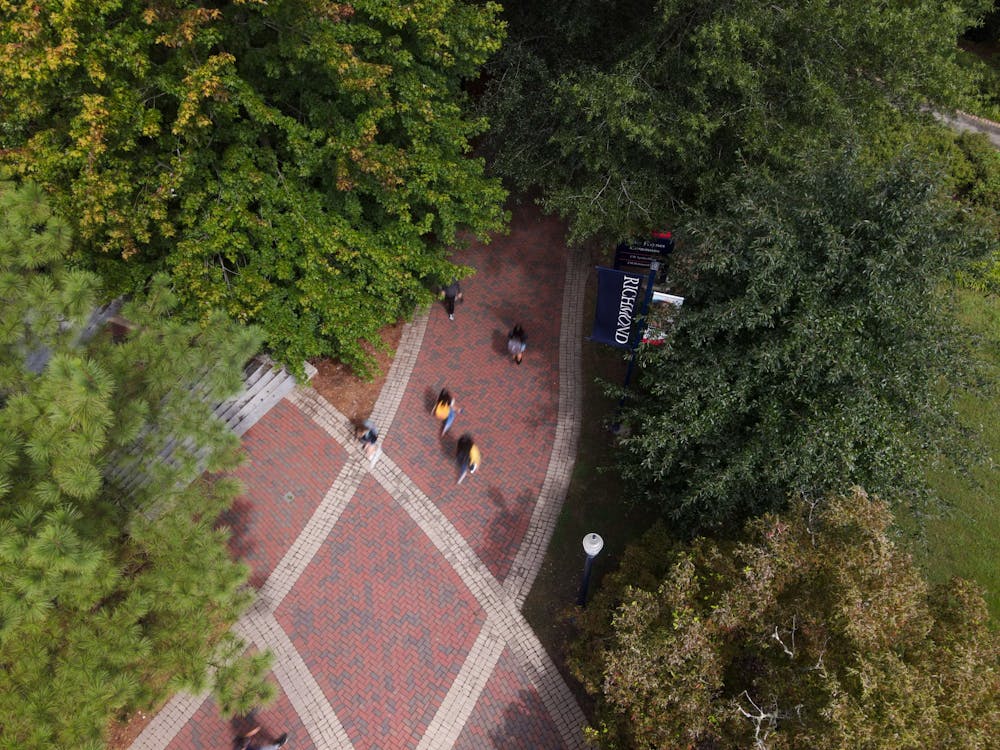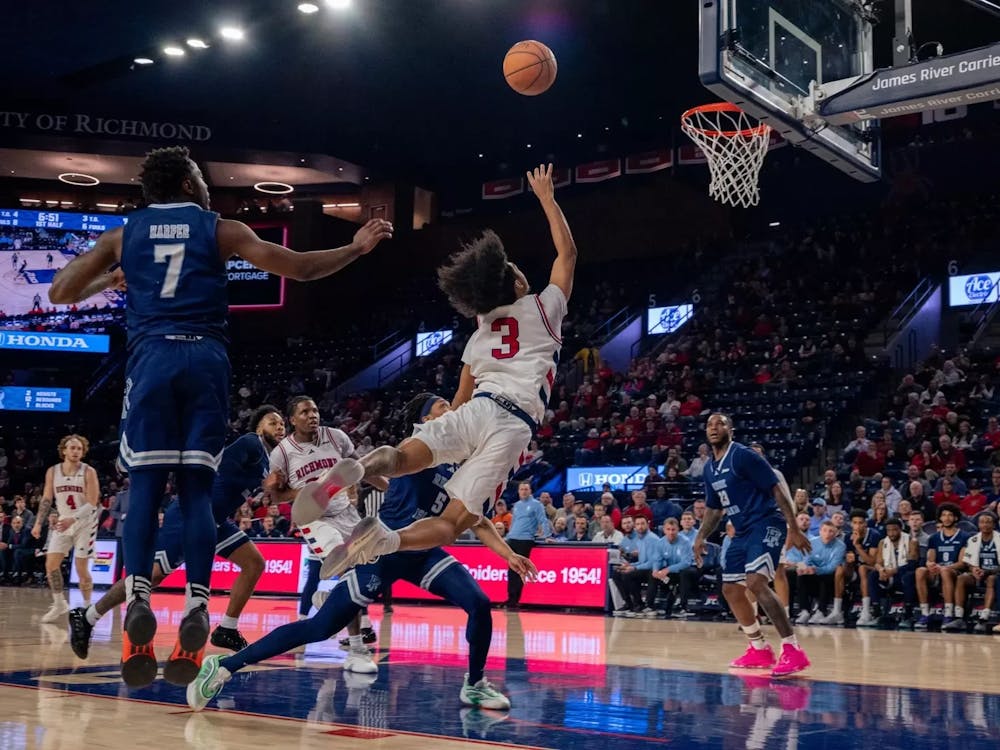Senior Moe Kassem noticed that the majority of the tables at the Heilman Dining Center were filled with students that looked like each other. The predominately white sorority and fraternity members sat in the first room, the majority of the athletes sat with their teams in the front of the second room, the international students sat with each other in the back of the second room and students outside of those categories sat together in the third room.
“Certain tables in the dining hall seem to include people who look the same and come from similar backgrounds,” Kassem said.
In its ranking for little race and class interaction, as reported by The Princeton Review, UR improved from one of the most segregated campuses in the country, ranking No. 4 in 2019 to No. 13 in the 2023 rankings. The Princeton Review’s methodology for assessing self-segregation is based on how strongly students agree or disagree with the statement, "different types of students (Black/white, rich/poor) interact frequently and easily."
The Princeton Review conducted a national survey of 165,000 students at 389 colleges. It published the best and worst 25 colleges with least race and class interaction and most race and class interaction. The majority of schools on the list for the worst 2023 are smaller East Coast schools including Quinnipiac University and Providence College coming in at No. 1 and No. 2 respectively.
Alpha Kappa Psi, a business fraternity at UR, created a position on the executive board in fall 2021 fully dedicated to diversity, equity, and inclusion. Katherine Pham, current president of AKPSI, was the first-ever vice president of DEI.
The business fraternity always had a DEI committee, but had never before had a position on the executive board that specifically focused on it.
“After everything that was going on with the school in terms of the changing of the names, the dis-affiliations, and the protect our web initiative, these movements and our terrible ranking for race and class interaction really highlighted the need for someone on the executive board to have a focus on DEI because that was the direction we wanted to take the organization,” Pham said.
AKPSI wasn’t alone in creating this position. Many other organizations and clubs on campus recognized the need for a DEI chair on their executive boards.
All of UR’s sororities created a DEI role on each of their executive boards and the sororities also have a DEI head for all of the Panhellenic council.
Olivia Seeber, a senior and Tri Delta’s stand-in DEI chair, said she was working with the members in her chapter to discuss events in the UR community, such as the Pride Festival, that would increase awareness for DEI among sorority members.
“We were not at school for Pride month, so I gave a presentation on the history of Pride Month and why the intersection of identities is really important to consider in the perspective of pride,” Seeber said. “I encouraged people to go to a pride event in Scott's Addition.”
The process of getting into a sorority has also changed recently to make it more of an inclusive process, with one of the biggest differences being relaxed clothing requirements for potential new members. This is an initiative to not expose a class gap and further self-segregate certain individuals at UR Seeber noted.
Enjoy what you're reading?
Signup for our newsletter
All Panhellenic members also have to complete DEI modules upon acceptance into a sorority, said Seeber.
During Seeber’s first two years, in 2020 and 2021, she said she noticed how cliquey everyone was and believed a lot of that came from a group’s social distancing.
“People tend to flock to people they are similar to,” Seeber said. “We are starting to finally have people joining the school who don’t have COVID-19 restrictions and are able to get involved in a lot of areas around campus and meet a lot of new people in a way that differs from my freshman and sophomore year.”
International students on campus also feel isolated from their peers at UR, because they are a minority group. Many international students on campus believe that the American students don't put in effort to try and be friends with or include students from other countries, Kassem said.
Kerry Ann Moyo, a senior from Zimbabwe and a Resident Assistant, said that UR is not the most diverse university which could’ve contributed to the self-segregation issue.
Both Moyo and Kassem have observed patterns in how little students of different backgrounds interact with each other on campus, they said. They agreed that students of similar backgrounds tend to form close-knit groups and then stick to those groups.
Moyo said she hasn't seen many multiracial groups walking around campus. Moyo also noted that fraternities and sororities are predominantly composed of white students.
“The role of fraternity and sorority culture does not seem to be intentionally dividing, but I do believe that it can inadvertently foster xenophobia, racism and homophobia,” Kassem said.
Moyo and Kassem agreed that the dining hall is a common place where students self-segregate themselves. Students often sit in groups that appear to share similar backgrounds with one another, they said.
Jordan Jones, a senior and member of the Black Student Alliance, said the dining hall is one of the most self-segregated spots on campus.
“I think one of the best ways to help our students is to address the self-segregation that we do see,” Jones said. “A big place where this is visible is in the dining hall. Implementing programs where others invite new students to sit with them or small acts of resistance, like sitting in a room you don’t usually sit in are ways we can start to break the status quo.”
Moyo said that while the Office of Undergraduate Admissions has made efforts to admit more students of color, there's still work to be done to change the culture of the university, she said.
UR’s class of 2027 is made up of 11% international citizens, 27% are U.S students of color, and 36% are U.S or international students of color.
Paraskevi Kotsakiachidou, a sophomore from Greece, said that students tended to hang out with those who shared their nationality due to familiarity, which is a common theme amongst students at UR. She said her accent had sometimes led to different treatment by American peers and classmates.
“One time I was asked, ‘do you even speak english?’ as friends and I were playing an innocent card game,” Kotsakiachidou said. “This made me feel incredibly segregated from my peers.”
Maddy Sesay, a senior on the women's lacrosse team and a member of the DEI Equity Council and DEI chair for the Student Athlete Advisory Committee, said that she believes that UR is becoming more diverse and has been able to make friends with various backgrounds.
“I believe the promotion of affinity groups and cultural events by students on campus leads to the attraction of a more diverse pool of applicants and therefore contributes to even more improvements in our self-segregation ranking,” Sesay said.
Student-athletes of color have created the Student Athletes of Color Alliance, a sector of the Student Athlete Advisory Committee. This organization was created after the Black Student Athlete Summit Conference in Houston, Texas that four Richmond student-athletes attended in May 2022.
Logan Anderson, a senior on the women's soccer team, the Student Athlete Advisory Committee president and the Student Athletes of Color Alliance Public Relations and Social Media Director, was one of the founding members of the group at UR in 2022.
The Student Athletes of Color Alliance is inclusive to people of all races, ethnicities and backgrounds and anybody who is supportive can join. The group's mission is to integrate students of all backgrounds, to help them find a circle of people they align with on campus, Anderson said.
The Student Athletes of Color Alliance had an inaugural event with the BSA in February 2022.
“Our family feud event was such a hit. It was awesome to bridge the connection between athletes and non-athletes which across the board, regardless of background, is a hard thing to do,” Anderson said.
This event was a huge step in the right direction to make students less marginalized and alone and feel connected to a group, Anderson said.
Anderson said that having faculty and staff who are supportive of the opportunities that UR provides is important to the recent success of DEI initiatives and moving our campus towards a more inclusive and less self-segregating place, she said.
Along with students, some faculty believe they are doing their best to help our campus be less self-segregated and bring students together.
Melissa Falk, associate vice president and dean of admissions, wrote in an email to the Collegian that the admissions office was committed to enrolling diverse and talented incoming classes which hopefully would lead to further positive movement in the self-segregation ranking.
“The application review process uses UR’s mission and values as a framework to identify students among many academically talented applicants whose values and engagement align with UR’s spider values,” Falk wrote.
Contact news writers Carly Cohen and Claire Le Du at carly.cohen@richmond.edu
claire.ledu@richmond.edu.
Support independent student media
You can make a tax-deductible donation by clicking the button below, which takes you to our secure PayPal account. The page is set up to receive contributions in whatever amount you designate. We look forward to using the money we raise to further our mission of providing honest and accurate information to students, faculty, staff, alumni and others in the general public.
Donate Now



